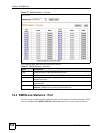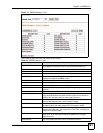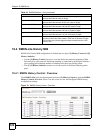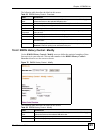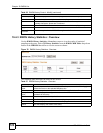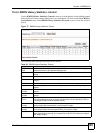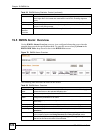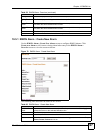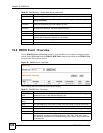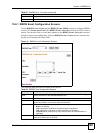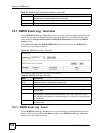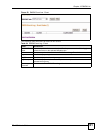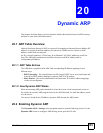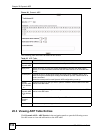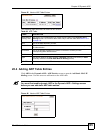
Chapter 19 RMON-Lite
ES-1528 User’s Guide
128
19.6 RMON Event : Overview
Use the RMON Event : Overview screen to view and delete event entries configured on the
switch. Select [9] Event from the RMON MIB Table: drop down listbox in the RMON-Lite
screen to view the screen as shown.
Figure 80 RMON Event : Overview.
The following table describes the labels in this screen.
Sample Type Select the method of obtaining the sample value. Choices are Absolute and Value.
Startup Alarm Select the startup alarm type (Rising Threshold, Falling Threshold, Rising Or
Falling Threshold).
Rising
Threshold
Specify a rising threshold (between 0 and 2147483647). When a value is greater or
equal to this threshold, the probe triggers an alarm.
Falling
Threshold
Specify the falling threshold (between 0 and 2147483647). When a value is smaller
or equal to this threshold, the probe triggers an alarm.
Rising Event Select an index number of a rising event.
Falling Event Select an index number of a falling event.
Owner Enter a descriptive name of the application that creates this entry. You can use 1-64
printable ASCII characters. Spaces are not allowed.
Apply Click this to save the settings to the switch.
Alarm Overview Click this to go back to the RMON Alarm : Overview screen.
Table 60 RMON Alarm : Create New Alarm (continued)
LABEL DESCRIPTION
Table 61 RMON Event : Overview
LABEL DESCRIPTION
RMON MIB
Table:
Use this drop down list box to select the MIB table you want to view. Click Apply to
refresh the screen to the selected MIB table view.
Refresh Click this to update all the fields in the RMON Event : Overview screen.
Create new
Event
Click this to configure new events on the switch.
Index This field displays an event index number. Click this number to edit the event entry.
Description This field displays a description of the event.
Type This field displays the event type (1:None, 2:Log, 3:SNMP-Trap, 4:Log-and-Trap).
Community This field displays the community or SNMP trap.
Last Time Sent This field indicates the value of system up time on the switch when this event was
last generated. It appears in the following format “XXD: XXH: XXM: XXS”, where
“XX” stands for a number and “D” stands for days, “H” for hours, “M” for minutes and
“S” for seconds.



